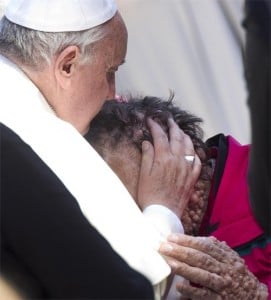Sarah Moon is offering a series of posts on pacifism that dispel some myths about pacifism and challenge those who call themselves pacifists. This morning, I was drawn to this statement:
When you start to see dehumanization and oppression and poverty as violence, you have to admit that no matter how anti-violence you are, you may be participating in perpetuating it.
You can fantasize about how you would dodge the draft, but if you’re restricting access to education and livable wages, you’re pushing people into the military. If you’re promoting benevolent sexist and white savior stereotypes, you’re helping politicians convince the general public that our wars are just.
A few years ago there was a horrible incident in Pennsylvania where Charlie Roberts opened fire on 10 Amish school girls. Five girls were killed that day before Roberts took his own life. The nation was in shock. The death of a child is impossible to think about. The recent killing of in Sandy Hook Elementary confirm just how devastating the killing of children is. Eighteen kids and 6 staffers were shot and killed that day.
The Amish response to these killings was perhaps as baffling as the shooting itself. We are a society of rather vengeful people. We want punishment first and talk later. Which is why a response of grace does not compute. But punishment is not the only response.
Donald Kraybill, is a sociologist at nearby Elizabethtown College and co-author of Amish Grace: How Forgiveness Transcended Tragedy.
“I think the most powerful demonstration of the depth of Amish forgiveness was when members of the Amish community went to the killer’s burial service at the cemetery,” Kraybill says. “Several families, Amish families who had buried their own daughters just the day before were in attendance and they hugged the widow, and hugged other members of the killer’s family.”
This does not mean that there needs to be some sort of justice to hold perpetrators of violence responsible for the harm they do to others. But there are choices we can make to stave off the spectre of continued violence. There are ways to deny the power of violence in a society.
Which is why the Orthodox response to the hundreds of deaths of children and others in Syria does not make much sense to a nation that demands violent punishment for death. When missile attacks and military intervention seemed to be the only option in the United States, the Orthodox Peace Fellowship, consistent with the statements of Orthodox bishops all over the world, sent an open letter to President Obama asking for a different response:
Chemical weapons use is an unspeakable evil which we all condemn. But the situation in Syria is far too complex to isolate this event as singly requiring a military response from the United States. Please consider all possible options short of military attack to punish or deter the use of these weapons. We believe any assault by the US will not only fail to deter chemical weapons use but may make their further use in desperation more likely…We further support all non-military, legal, and humanitarian interventions to help end the violence and establish a just peace for all Syrians.
The only way to be truly pro-life is to support the entire lifecycle of creation from birth to death. We pray even then for the dead because we know that no one actually dies for Christ destroyed death with his own death and Resurrection. If we are a people who are resurrected with him, what other response to violence can we give, but one that cherishes peace and the dignity of life in all of us?











